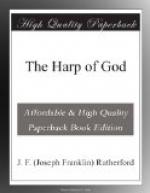[107]Under the rule of descent, the firstborn or eldest son was the heir of the father’s estate and any other rights or privileges that went with that estate, unless for some cause there should be an exception to the rule. Esau having been born a few moments before his brother Jacob, under the operation of this rule would be the successor to the Abrahamic promise and heir to his father. His birthright, therefore, would include the promise made to Abraham. But the Lord clearly indicated that there should be an exception to the rule in this case and that Jacob should be the heir and not Esau. When it was known that the mother would bear two sons, and just before the time of their birth, Rebekah the mother inquired of the Lord concerning the expected children and the Lord said unto her that two sons would be born to her and that the elder should serve the younger. (Genesis 25:22,23) This definitely shows that it was God’s purpose that Jacob, who was born last, should be the heir and successor to the Abrahamic promise.
[108]These two sons grew to manhood’s estate. Esau became a great hunter and loved the outdoor sports; while Jacob was a plain man, remaining quietly at home. Esau showed that he did not appreciate the birthright, viz., the Abrahamic promise, even if it were his, which in fact it was not, since God had foreordained that it should belong to Jacob. Esau thought more of his own selfish, immediate comfort than anything that might come to him by reason of this promise. On one occasion he was in the field hunting. He returned hungry and faint. He found that Jacob had prepared a pot of lentils. When Esau smelled this appetizing food he said to Jacob: “Feed me, I pray thee, with that same red pottage, for I am faint”. And Jacob said: “Sell me this day thy birthright”. “And Esau said, Behold I am at the point to die: and what profit shall this birthright do to me? And Jacob said, Swear to me this day; and he sware unto him: and he sold his birthright unto Jacob. Then Jacob gave Esau bread and pottage of lentils; and he did eat and drink, and rose up, and went his way: thus Esau despised his birthright.” —Genesis 25:27-34.
[109]Genuine, real right and title to the birthright was now Jacob’s for two good and sufficient reasons: (1) because it was so ordered by the Lord before his birth, as above stated; and (2) because he had bought it in an open and fair transaction with his brother Esau. These two brothers were not mere children at this time. They were past forty years of age (Genesis 26:34), both capable of entering into a contract; and they made a contract which was binding upon both.
[110]Notwithstanding these two good reasons why Jacob was justly entitled to the birthright, Esau attempted to deprive him of it. The birthright carried with it the privilege of the special blessing from their father. Isaac was old and his eyes were dim, so that he could not see; and he knew that the day of his death might be near. (Genesis 27:1,2) He directed his son Esau to go into the field and take some venison and bring it to him that he might eat; and give Esau his blessing.




